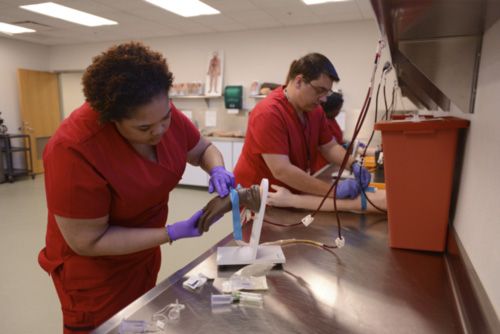
Contact the Pensacola State College Allied Health Department for assistance in planning your program of study.
phone: (850)484-2544
email: healthprograms@pensacolastate.edu
RELATED DOCUMENTS
- Application | Health-Related Programs Application
- Phlebotomy | Certificate Information Packet
- Spring 2025 Limited Access Program Application Information
RELATED LINKS
- About PSC's Health Related Programs
- Health Sciences Learning Center
- PSC announces fees for allied health, nursing, truck driver programs
SITE LINKS
SEARCH PROGRAMS
INTRODUCTION
The Phlebotomy program trains students in the basic and supporting skills of the phlebotomist. Skills include: specimen collection by venipuncture and capillary puncture, basic anatomy and physiology, infection control, safety, and patient relations.
This program meets the requirements for taking the Phlebotomist National Certification Exam through the National Health Career Association (NHA) and the America Society of Clinical Pathology (ASCP).
IS THIS FOR YOU
People in this career prefer to work indoors, enjoy the human relationship, and have good eye and hand coordination. They must be sociable and cooperative. People in this career are sometimes described as analytic, patient, tactful.
BEYOND GRADUATION
Graduates from the Phlebotomy program may advance in career by earning certification from the American Society of Clinical Pathologists (ASCP) or the National Healthcareer Association. They may also pursue an associate degree in a medical technology or nursing program at Pensacola State College.
RELATED CAREER OPPORTUNITIES
Primary Employers
Graduates from the Phlebotomy program support the health industry in hospitals, nursing and convalescent homes, blood centers, and offices and clinics of physicians.
Occupations
Phlebotomists/Phlebotomy Technicians
Duties of the phlebotomist include drawing blood by applying a tourniquet to the arm, locating the accessible vein, swabbing the puncture area with antiseptic, and inserting the needle to draw the blood. After withdrawal, the blood is labeled, stored, or forwarded to laboratories for analysis. The phlebotomist may also prick fingers to draw blood, take vital signs, and screen patients for various conditions and information.
Other Occupations
- Hemodialysis Technician
- Home Health Phlebotomist
- Blood Banking Technician
- Plasma Bank Technician
- Patient Care Technician

 PirateQ
PirateQ 